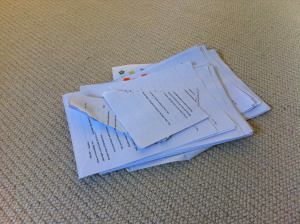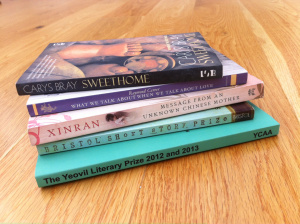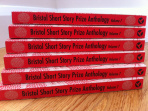Fiona Mitchell's Blog, page 11
August 26, 2015
Is Your Novel Ready To Submit?
I thought I knew the answer to this question. I’d written and rewritten my first book, given the thing to friends to read, gone back to it and changed bits. And then I’d sent it off to agents, in full book deal fantasy mode.
I’ve probably submitted about 30 times in all, but each of those submissions was flawed. A central character lacked depth, another character wasn’t as funny as she should have been. You know the drill.
And so the rejection letters stacked up, sometimes with reasons: ‘it’s not enough to stand out in today’s overcrowded fiction market.’ Oh yeah? ‘I didn’t fall in love with it.’ Well, you can’t argue with that.
Then something fortuitous happened, a gem of a thing. An agent read through half of it. She loved my concept, my writing, but the characters’ voices just weren’t strong enough, she thought. I know it’s all subjective, but the thing is, I agreed. All my editing had turned the characters into papery beings, people on the wrong side of dull.

Me old novel!
I started over. I didn’t write it chapter by chronological chapter. I wrote one character in her entirety in one file, another character in another file and so on – that helped me to discover each character and give them a distinct voice. I then fitted the novel back together with its brand new plot and a completely different ending.
I’ve edited it, and given it to one person to read – he loved it. Another friend has started reading and is two chapters in. As it stands, my book is the best it can be at this moment in time. The characters are strong (I think, but then I’ve thought that before), the plot line has drive, (but then I’ve thought that before too).
So is it ready to send out? One more proofread and yes, I think it is. Cue fantasy mode again.
But the beauty of starting over is this: I’m hoping that this new book has all the magic of the original draft of my first book before it got ironed flat by edits.


July 15, 2015
What it’s like to Win a Writing Competition
I started the year with a writing wish list. There were just two things on it: Win a writing competition and find a literary agent to represent my work.
The year’s gone pretty well so far; I’ve had several requests for the full manuscript of my first book, but still no offer. Yet. (I am manically rewriting.)
And then Frome happened – the Frome Short Story Competition. This year, lauded author Samantha Harvey was judging. Oh my, imagine that. I went into full-on dream mode. After much rejigging and rewriting, I entered my story about a migrant worker in Singapore called Plenty More Where You Came From.
Then I carried on redrafting my first novel. Weeks later, an email arrived saying I was in the Frome shortlist. I hadn’t even realised I was in the longlist. Fantastic – something else to say in a query letter to a literary agent.
On Sunday, I headed down the motorway to Frome. Then there it was, the library where the awards ceremony for the competition was going to take place. Other writers, other shortlisted entrants – there were 13 of us – would be there. Samantha Harvey would be there too, and the organisers Brenda Bannister and Alison Clink. There was a fair going on in the car park. A bloke in a mask was poking a rod at a metal head spouting fire, its ears belching steam. I wasn’t sure what that was all about, but my head felt furnace-hot too. God, I wanted to win.
Inside the library, the ceremony kicked off with Samantha Harvey talking about how much she’d enjoyed this year’s shortlist. Choosing first, second and third place hadn’t been easy at all, she said, the stories were that strong. She talked about how writing competitions have become increasingly important in publishing, but that really just writing is the most important thing. Don’t be distracted by not making a shortlist, by not winning, or even by winning – just write.
Liz Gwinnell took third place with Under the Mango Tree. It was great to put a face to the name – I’d read Liz’s story, Where Hummingbirds Fly, which won third place in Frome back in 2013. That story helped to inspire me to enter Frome this year. I so loved its rich, distinct, voice. Kath Grimshaw won second place with Hotel Room.
Then Samantha described the winning story. An ugly story written with such beauty. Could it be mine? Set in Singapore. Hell, it was mine. Not knowing the names of any of the entrants – the whole thing is judged anonymously – Samantha said the title of my story.
‘It’s me!’ I squeaked and stood up.
I shook hands with Samantha and she handed me my 300 pound prize. And then I read my story out, all 15 minutes of it. And people clapped (thanks for that, people). I walked back to my seat and Samantha’s mum, who was sitting behind me, pumped her fists and said, ‘Well done.’
I’d done it, finally a winner.
We spent the next hour in an art gallery next door to the library where many chocolate brownies were chomped and much talk about writing was had. What happens to you when you write? When do you write? Have you written a book? And thanks Liz Gwinnell for wrapping me another brownie for the journey home. I got lost, so that brownie ended up being my tea.
So on winning: Well, it feels brilliant, it really does because someone who’s rated reckons I wrote something beautiful. And now back to the business of writing.
http://www.fromeshortstorycompetition.co.uk/plenty-more-where-you-came-from/


June 1, 2015
Sending out to Agents – Three at a time or Scattergun?
When I ‘finished’ my first novel (I use the word ‘finished’ because it sure as hell isn’t – that’s all too clear to me now), I sent the book out to three agents at a time. Standard rejection letters came back. One competition shortlisting later, one agent liked it enough to meet me and talk through changes. She didn’t take me on, so I made further changes and scattergunned loads of other agents with it. One of them requested the whole book, but I didn’t hear from her again. Ouch!
Then more rejections piled up, this time with compliments thrown in. ‘It rose to the top of the pile.’ ‘You’re talented’, that kind of thing. But it was a bit like someone finishing with you. ‘I like you; it’s just I’m not in love with you.’ I emailed my friend and soon-to-be published author who’d read the first chapters of the book and loved them. (Believe me, she’s not a good liar). ‘Maybe it’s just a bit crap,’ I said. ‘Because I don’t get why no one’s taken it on.’
Then last week, came my answer. I emailed an agent who seemed to be looking for just my kind of book: a moral dilemma in an unusual setting. Fifteen minutes later, the agent requested the entire book then contacted me to say she was ‘really enjoying it.’ She hasn’t taken me on. However, she does want to read it again if I’m able to transform it.
Her email was a turning point because she was so honest, so detailed and so helpful. And boy am I grateful because there’s not that many people who’ll be honest about your book. ‘That’s lovely, darling.’ (Your parents.) ‘You want me to read it again?!’ (Your husband.) ‘Oh it’s brilliant, just brilliant.’ (Your friends, who’re actually thinking, Jesus, that was hardgoing.)
So why has no one taken my little book on yet? Because it’s too blooming bleak. But it does have ‘ENORMOUS POTENTIAL.’ Yes, ‘ENORMOUS POTENTIAL!’
I’m mulling again, researching, thinking, planning, locating my funny bone. And then ding-ding, there will be a Round Four to this book. There’s just a small matter of fine-tuning my second book, shelving book three for now. Oh, and earning a living. And as for firing your manuscript off to loads of agents, I wouldn’t bother. Do a bit of careful research on what agents are looking for then send out to your chosen few, I reckon.


April 24, 2015
Writing Competitions – Why Bother?
It’s there in black and white, the longlist and your name’s not on it. The disappointment sinks you. That voice starts nagging at your ear. ‘You’re fooling yourself about this writing malarkey; you must be, else you’d be up there too.’
Somehow you manage to scrape your fried-egg-ego off the floor and force yourself to start typing something new.
Why do we do it, eh? Why do we waste 8 quid, 10 quid, sometimes 25 quid when, with more and more people entering writing competitions, we stand such a miniscule chance of being one of the chosen few.
I’ve been on both sides of the fence – what writer hasn’t? – but getting placed in this year’s Writers’ and Artists’ Short Story Competition was just the way to do it, I reckon. Enter the story then completely forget about the date that the results are revealed. I found out that my story Antelope had made the final 19 when another writer Tweeted me to tell me.
That’s so rarely the way it happens, right? I mean, how can you score through a date that’s so firmly etched into your brain?
So when the big day arrives and you discover your name’s not on the longlist, resist the urge to whack yourself over the head with a saucepan for not being quite good enough. Maybe you are, but if your work doesn’t strike a chord with the early readers in competitions, you’re out. Maybe you almost got through – who knows? – or maybe you just don’t have the same writing tastes as the judges.
Case in point – last year I was lucky enough to be in the Bristol Short Story Prize shortlist. Here’s a confession – I entered the same story, albeit a much shorter version, into the Yeovil Prize, and it wasn’t even placed. Even though, I like that story so much better than the one which Yeovil commended me for back in 2013.
It’s all about your audience. So this year, right back at you, Yeovil; I’m hitting you with something new.
In fact, I’ve got that many short stories up my sleeve now, I’ve got one for every UK competition that’s going. Only I’m not going to enter everything – there’s only so much disappointment a girl can take.
So why bother entering anything at all – because being placed occasionally really does help to silence your own self-doubt, for a while at least. And it’s a small voice of encouragement that you might just be doing something right.


April 20, 2015
When NOT to start Writing
Be patient. That’s what my soon-to-be-eighty dad told me last week.
I’d been chatting with my parents about writing, sharing my agitated ideas for my third novel with them.
‘Be patient,’ said my dad in his soft Irish lilt.
This from a bloke who has never kicked the cardboard on an Ikea flat-pack. This from a bloke who has hung doors without swearing. He goes on long walks on winter-thick days, my dad, and he’s the most patient person I know. 
I’m pretending I’ve inherited the skill. I’ve forced myself to stop pacing; I’ve shut down my computer each night at nine. I’m still working on book three though, walking forwards with it: Listening, watching, waiting.
There are lots of ideas swilling around in my foggy head, it’s just I’m unsure they’re the right ones. There’s a story about a woman and a teenage girl. There’s a corrosive, white landscape. There’s a feisty little voice whispering at my ear.
Book three is gathering, percolating, but it’s a bit blurry still. I wrote 50,000 words of a book once which ended up in the trash can because I’d started without thinking it through properly. So for now, l’m doing like my dad and being patient. Because the best work comes from patience, don’t you think?


March 13, 2015
What NOT to do when a literary agent reads your book
Three years ago, I finished my first book, The Maid’s Room. I entered it into a competition and although it didn’t win, it was among the final three on the shortlist. A literary agent liked it enough to meet me and ran through the things I should change. One thing I needed to do was big up one of my main characters.
I patted and shaped, tore the book to pieces and put it back together again. And in the middle of all this, I ended up on the shortlist of another major competition. Yes, I clenched my fists and jumped up and down. This is it: signing with an agent, here I come. Except, it didn’t quite go like that.
The agent enjoyed the first half of The Maid’s Room, but didn’t fall in love with it. Oh I admit it, I snivelled.

But not for long. The next day, I started my second novel and spent three months bashing away at the keyboard until it was finished. (It’s now in the polishing stages.)
Something unexpected happened then. I started to think about The Maid’s Room. I tried not to, I really did, but there it was – with its underground car parks, its jackfruit and its rambutans. There it was, with its slums and sand clogged with hair. I could see suddenly how everything in the story connected. I hadn’t seen it back then when I’d been so close to landing an agent. When she’d asked me to rewrite a third of the book and give that character new life, what I’d done was create someone flat and unbelievable, someone dull, not the feisty and clever and tactless woman she is now, not the woman with three dimensions instead of just two. Worse than that though, I’d written the whole damn soul out of the book.
Well, now, I’ve put the soul back in. I’m proud of it, really proud, in a way that I wasn’t before. Best make a start on sending it out then……



February 9, 2015
In praise of the Short Story
I’m so enjoying short stories at the moment – reading them and writing them. You get yourself an idea; you spend hours researching it, then you bang away at the keyboard until it’s done. You can explore ideas that aren’t sustainable over 300 pages, and you might even get yourself a bigger idea. One that’ll morph itself into a novel. Failing that, perhaps you’ll meet a character that you’ll want to stay with for longer.

A few short story collections from my shelves….
This year’s Costa Short Story finalists have been an inspiration. How I loved Zoe Gilbert’s Fishskin, Hareskin and the beautiful Glassblower’s Daughter by Lucy Ribchester. Benjamin Myers’ A Peacock, A Pig in the Bristol Short Story Prize Anthology Volume 7 did things to my stomach that hurt – it was that brilliant. And how I laughed my way through Kevin Franke’s A Visitor, runner up in last year’s Writers & Artists Short Story Competition.
So here I am without the big idea for book three, (Well, there is an idea, I’m just not sure it’s the right one) but I can’t stop writing littlies. I’ve written six over the past three months and I’m pleased with them, especially one particular favourite.
I was going to give myself a grand goal this year – a short story a week. But perhaps that’s a bit too grand, given that I’m job hunting – so here’s a lesser promise. A short story a month for the rest of 2015. I’ll have me a collection by the end of the year (well, I’m hopeful anyway) and maybe I’ll find that big book idea along the way.


January 8, 2015
An editor for your novel – what’s the blooming point?
My second novel has been pummelled and cut, puzzled over and well and truly tinkered with – and it’s time to push it into a drawer for a few weeks so I can see its other faults when I pull it out again.
I got my editorial report back from literary consultancy Cornerstones a week before Christmas and prepared myself for a let down. But the corners of my mouth started to lift: The ending worked, the middle too. The story is compelling and marketable. There was even a few compliments thrown in, quite a few actually. Oh my. Of course, in true self-deprecating fashion, I zoned in on the negative. The first third needed work; lots of it. And one of my peripheral characters was really quite annoying.
Isn’t it weird? I have to confess I hadn’t seen any of these things. Well, maybe I had my suspicions that that peripheral character was a right royal pain in the jacksy, but why is it that it’s only when an editor points these things out that you can truly see them? Maybe it’s just as Stephen King says in On Writing, that:
‘To write is human, to edit is divine.’
So anyway, I’ve done loads of work on the second novel – I’ve slashed out the waffle at the beginning and a few weeks ago, I met a magical and inspirational woman who has become that now not-at-all-annoying peripheral character.
I’m feeling good about this book, very good about it, very hopeful in fact. But then, isn’t this always how these things start? Well, we’ll see.








